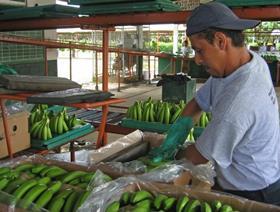
Bananas will be one of the products that stand to benefit the most from the trade agreement due to be signed between Ecuador and the EU on 11 November. Exporters believe they could increase shipments by 5 per cent in 2017 as a result of the deal, which will cut tariffs and lead to the gradual elimination of import quotas by 2020.
In 2015 the country shipped around 122m boxes of bananas to Europe, from an export total of 317m boxes. Ecuadorean bananas have benefitted from a gradual reduction in tariffs on its exports to the EU since 2009 after the World Trade Organization ruled in its favour in the long-running dispute with Europe on preferential access for fruit shipped from its former colonies.
Ecuador has gone from paying €175 per tonne in 2009 to €126 per tonne this year. The new agreement will bring the tariff down to €97 per tonne from January, putting Ecuador on an equal footing with other Latin American suppliers such as Colombia, Peru, Costa Rica and other Central American countries, who have had trade agreements in place with the EU since 2013.
The deal will also increase Ecuador’s quota from the current 1.7m tonnes a year to 1.8m tonnes in 2017, before its permanent removal in 2020.
Eduardo Ledesma, director of the Association of Banana Exporters of Ecuador (AEBE) claims that the country has the potential to boost shipments to the EU while simultaneously improving its productivity.
“At 1,700 boxes per hectare per year, our productivity is still one of the lowest in the region,” he said. “By comparison, FAO figures show that Costa Rica gets an average yield of about 2,600 boxes per hectare, and Colombia about 2,200 boxes per hectare per year.”
Ledesma believes that with improved yields annual exports could reach 400m boxes by 2020. Although Europe is the main market for Ecuadorean fruit, its share fell by 10 per cent in 2016 to around 90m boxes.
Exporters are optimistic that under the new agreement with the EU, they will be able to recover that 10 per cent and even see an increase of around 5 per cent in sales next year.
Ecuador will also benefit from a change in the quota volume that the EU sets under the agreement for Ecuadorian fruit to join the benefits. 'This is the way the EU prevents Ecuador, the largest banana exporter in the world, from flooding the European market and harming the production of its former colonies.'



